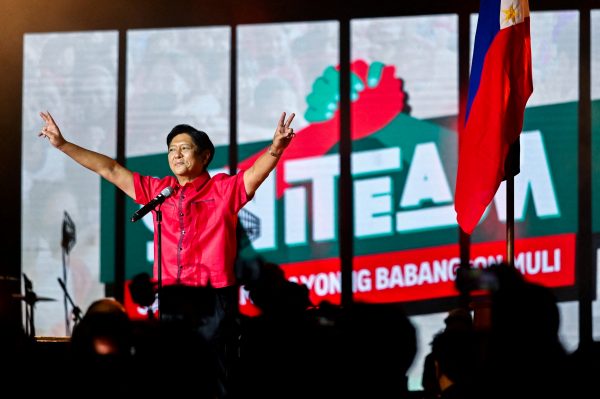Duterte has presided over unprecedented mass violence in his so-called ‘war on drugs’, which has killed at least 30,000 people since he took office in July 2016, mostly poor men and youths in urban areas. On 15 September 2021, the pre-trial chamber of the International Criminal Court authorised an official investigation into Duterte for crimes against humanity. The charges encompass the violence of the bloody campaign as well as killings by the Davao City Death Squad during his lengthy tenure as mayor. Duterte’s punitive populism also escalated to lethal violence against those ‘red-tagged’ as communists or communist sympathisers.
Despite his populist ‘strongman’ leadership, Duterte has not completely evaded the curse of the lame duck president. His public approval ratings are sinking in the usual pre-election pattern, even if they remain relatively higher in scale compared to his predecessors.
Although the government’s provision of cash aid during the COVID-19 pandemic was popular, the administration’s overall response has been very poor. The economy expanded in 2021 but only after a 10 per cent contraction the previous year and a failure to release funds earmarked for healthcare frontliners, resulting in protests, strikes and an overseas exodus.
To make matters worse, Duterte was implicated in a Senate corruption investigation over government contracts for COVID-19 face masks and test kits. Duterte’s former allies are among the legislators leading the probe — a sign of his deteriorating influence. In a transactional Philippine Congress, Duterte is already discounted and politicians are positioning themselves to benefit from the largesse of his successor.
If he is not disqualified from running due to a prior tax evasion conviction, Ferdinand ‘Bongbong’ Marcos Jr is the frontrunner in the coming presidential election. Nostalgia for the dictatorship of his father, Ferdinand Marcos, cultivated on social media and endorsed by Duterte, promises a ‘back to the future’ for some Filipinos.
President Duterte’s daughter, Sara, is Marcos Jr’s running mate. Marcos Jr has made clear that he will obstruct the ICC investigation. Sara Duterte will also have an active interest in pushing back against any inquiry since she was Davao City mayor for part of the time under the probe.
But the formidable ‘Bongbong-Sara’ tandem was brokered by former president Gloria Macapagal Arroyo and reportedly side-lined the elder Duterte, who preferred that his daughter run for president herself. As allies, the Marcoses bring votes from the north and the Dutertes bring votes from the south. As rivals, they would erode each other’s voting base. Arroyo’s intervention prevented matters from coming to a head.
The incumbent Vice President Leni Robredo, in a peculiarity of the Philippine political system in which president and vice president need not be on the same ticket, is the de facto leader of the opposition and likely to be Marcos Jr’s strongest rival. But she has so far failed to unite an anti-administration bloc behind her.
Two candidates following the Duterte populist playbook — Isko Moreno and Senator Manny Pacquiao — initially posed as opposition but eventually courted the incumbent president’s endorsement, since Duterte’s antics have left the ruling party without a standard bearer.
Trailing behind, former police chief Senator Ping Lacson and labour leader Leody de Guzman remain the candidates to watch. If Lacson drops out, there could be some coalescing around Robredo or Moreno. De Guzman is pulling the policy debate to the left with talk of a wealth tax on the richest of the rich.
Unfortunately, the country’s dysfunctional one-round presidential election system means that a simple plurality is sufficient to win. This is disastrous for the divided and fractious anti-Marcos opposition.
In this gloomy context, the awarding of the Nobel Peace Prize to journalists Maria Ressa, a Filipino citizen and founder of the online news service Rappler, and Russian Dmitry Muratov was a bright spot in 2021. The Duterte administration has subjected independent media outlets to legal and economic pressure. In addition, Duterte has verbally attacked Ressa, Rappler and journalists, especially women, in general.
Words are lethal in a country that Reporters Without Borders already considers one of the most dangerous places in the world for media workers. Many signs point to the unmitigated erosion of democracy in the Philippines but the independent media — as well as an elected opposition and local activists — provide some constraints on unbridled power.
Perhaps there is some hope that Marcos Jr will not be able to replicate the ruthless rule of his dictator father.
Sol Iglesias is an Assistant Professor in the Department of Political Science at the University of the Philippines, Diliman.
David Camroux is an Honorary Senior Research Fellow at the Centre for International Studies (CERI), Sciences Po, Paris and a Professorial Fellow at the University of Social Sciences and Humanities, Vietnam National University, Hanoi.
This article is part of an EAF special feature series on 2021 in review and the year ahead.

